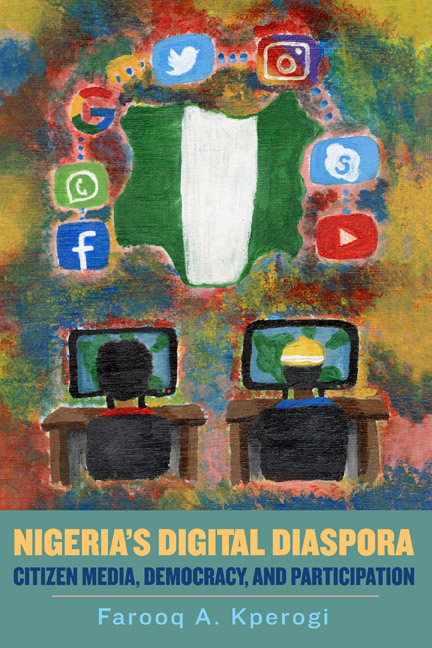Book contents
- Frontmatter
- Dedication
- Contents
- Acknowledgments
- Introduction
- 1 Citizen and Alternative Journalism: Mapping the Conceptual Contours
- 2 The Nigerian Press: From Colonial Evangelism to Guerrilla Journalism
- 3 The Nigerian Digital Diasporic Public Sphere
- 4 Profiles of Diasporic Citizen Media Sites
- 5 From the Diaspora to the Homeland: Role Reversal in News Flows
- 6 The Nigerian Government’s Response to the Diasporic Citizen Media
- 7 Domestic Online Media, Social Networked Journalism, and Participation
- 8 Mainstreaming of Diasporic Citizen Journalism and Implications for Nigerian Journalism
- Notes
- Bibliography
- Index
6 - The Nigerian Government’s Response to the Diasporic Citizen Media
Published online by Cambridge University Press: 13 April 2021
- Frontmatter
- Dedication
- Contents
- Acknowledgments
- Introduction
- 1 Citizen and Alternative Journalism: Mapping the Conceptual Contours
- 2 The Nigerian Press: From Colonial Evangelism to Guerrilla Journalism
- 3 The Nigerian Digital Diasporic Public Sphere
- 4 Profiles of Diasporic Citizen Media Sites
- 5 From the Diaspora to the Homeland: Role Reversal in News Flows
- 6 The Nigerian Government’s Response to the Diasporic Citizen Media
- 7 Domestic Online Media, Social Networked Journalism, and Participation
- 8 Mainstreaming of Diasporic Citizen Journalism and Implications for Nigerian Journalism
- Notes
- Bibliography
- Index
Summary
Intolerance of and unease with dissent is an abiding feature of the Nigerian state since its founding, as chapter 2 illustrates. As the later part of this chapter will show, the reactions of Nigerian governments from 2005 to 2019 to the critical searchlights beamed on them by the diasporic citizen media appear to be adopted from the germinal ideas initiated and executed by British colonialists against the critical gaze of the nationalist press. During Nigeria's colonial occupation by British imperialists, the critical journalism of the independent nationalist press was aggressively countermined through a three-pronged strategy. The colonial government sponsored rival, acquiescent, Nigerian-owned newspapers that endorsed and authorized colonialism. When that strategy was not successful, the colonial government chose to starve the independent nationalist press of advertising patronage, and encouraged British-owned private businesses to withhold advertising from the papers in hopes that they would wither and die. The continued vibrancy and stridency of the press in spite of these measures compelled the colonial government to enact repressive press laws, which gave a legal imprimatur to its all-out assault on the press. Nigerian military regimes borrowed from the colonial template in their dealings with the Nigerian press.
However, as shown in chapter 3, the brief periods of constitutional rule from 1960 to 1963 and from 1979 to 1983 saw a radically healthier and more tolerant attitude of governments toward critical journalism. Instead of the repressive suppression of dissent that we saw in colonial and military regimes, the civilian governments of the 1960s and the 1980s responded to oppositional, watchdog journalism by setting up their own newspapers to counter the scrutiny and attacks of the press, particularly of the politicalparty press, which dominated the media landscape in 1980s Nigeria. They also used spin doctors to influence news coverage and punditry, in common with many liberal democracies. There were no records of arrests and torture of journalists or the forceful seizure of newspapers.
In a curious twist, nevertheless, the reaction of supposedly democratic governments to critical diasporic citizen online journalism since 2005 is uncannily reminiscent of previous totalitarian colonial and military governments.
- Type
- Chapter
- Information
- Nigeria's Digital DiasporaCitizen Media, Democracy, and Participation, pp. 135 - 155Publisher: Boydell & BrewerPrint publication year: 2020



